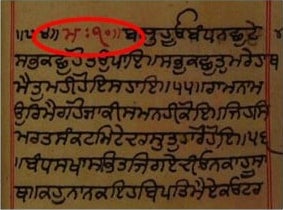Discover the significance of 'Mahala' in Guru Granth Sahib, denoting the spiritual lineage and authorship of Sikh Gurus starting with Guru Nanak.
ANAHATASABDA figures variously in the Guru Granth Sahib as anahadasabad, anahadatura, anahadajhunkara, anahadabain, anahatanada, anahadabani and anahadadhumand in the Dasam Granth as anahadabani and anahadabaja. The word anahata is from the Sanskrit language. It occurs in Pali and Prakrit texts as well. In the Sanskrit original, it implies unstruck; it stands for pure or immaculate in Pali and for eternal in the Prakrit. The suffix words like sabad or sabda, tura, jhunkara, bani and dhuni stand for word, rhythm, sound or speech. Thus, anahatasabda would mean the unstruck or pure or eternal sound. In a theistic system, anahatasabda would signify an eternal voice symbolizing the reality of God.
Discover GURU GIRARATH KOS, a detailed dictionary of the Guru Granth Sahib by Pandit Tara Singh Narotam. Learn about unique word interpretations and more.
Unveil the essence of Shabad in Sikh tradition—its role as divine revelation and spiritual enlightenment in the Guru Granth Sahib.
Explore the spiritual essence of Anjulia by Guru Arjan in the Guru Granth Sahib. Discover lessons on meditation, materialism, and divine will.
Explore Guru Nanak's profound impact on Punjabi literature and spirituality, as the revered first Sikh preceptor and poet.
Discover Shabad Hajare, seven sacred hymns from Guru Granth Sahib for daily recitation, reflecting divine 'presence' or 'separation' from the Lord.
Explore the origins and spiritual significance of Ad Bhavani, the Shakti of Shiva, in granting salvation and its distinction from Ad Shakti.
Explore the path to overcoming haumai, the spiritual and moral disease, through the wisdom of the Guru Granth Sahib. Unlock true peace today.
Dive into Guru Gobind Singh's sabdas, understanding their spiritual yearning and devotion, with Shabad Hajare enriching Sikh daily worship.






